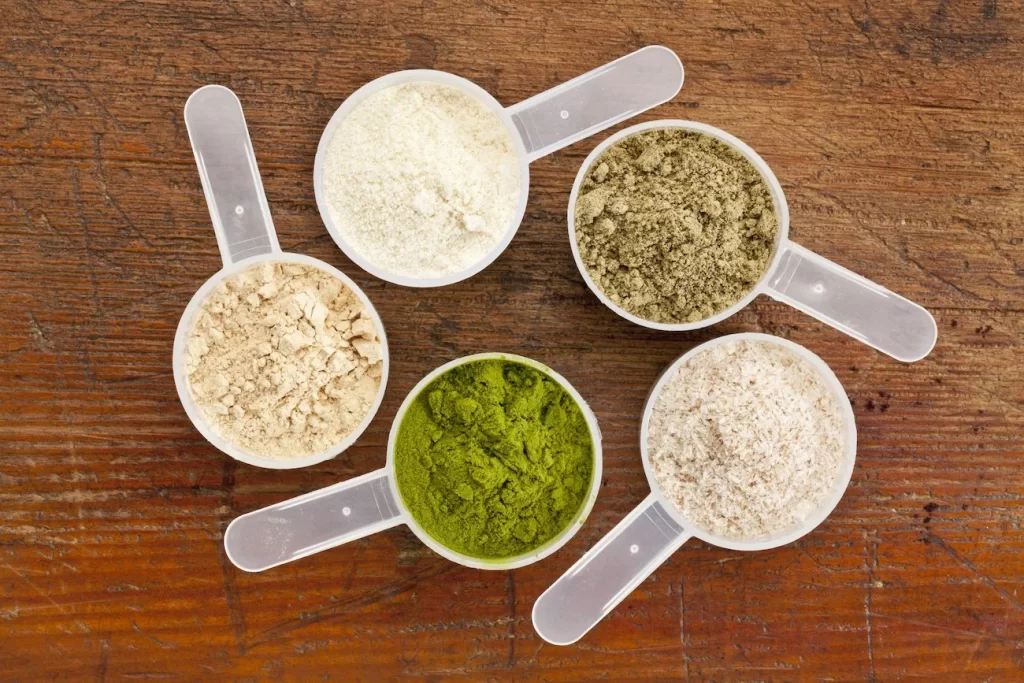In today’s health-conscious world, protein powders have become a staple for fitness enthusiasts and those looking to improve their nutrition. Among the most popular options are whey protein and plant-based protein powders. But with so many choices available, which one is right for you? This blog will compare the benefits, drawbacks, and scientific insights behind whey protein and plant-based protein, helping you make an informed decision.
Understanding Whey Protein
Types of Whey Protein
Whey protein originates from the liquid part of milk and is a byproduct of cheese production. It’s widely recognized for its high-quality protein content and is available in three main forms:
- Whey Protein Concentrate: Contains about 70-80% protein, along with some lactose and fat. It’s the most common and affordable type.
- Whey Protein Isolate: Contains 90% or more protein and minimal lactose and fat, making it ideal for those with lactose intolerance.
- Whey Protein Hydrolysate: Pre-digested for faster absorption, often used in medical protein supplements and infant formulas.
Whey Protein Benefits

Whey protein is considered a complete protein, meaning it contains all nine essential amino acids, including a high concentration of branched-chain amino acids (BCAAs) like leucine. Leucine plays a crucial role in muscle protein synthesis, making whey protein a popular choice among athletes and bodybuilders. Studies have shown that whey protein can effectively aid in muscle recovery and growth, particularly when consumed post-workout.
Additionally, whey protein is beneficial for weight loss. It promotes satiety and helps maintain lean muscle mass during calorie restriction, making it a go-to supplement for those aiming to shed pounds while preserving muscle.
Also Read-
- MuscleBlaze vs Optimum Nutrition: Which Whey Protein is Best?
- Top 5 Protein Brands To Buy On Amazon In 2024
Exploring Plant-Based Protein
Types of Plant-Based Proteins
Plant-based protein powders come from various sources, including peas, brown rice, hemp, and soy. Each source has its unique nutritional profile:
- Pea Protein: High in BCAAs and easily digestible, making it a popular choice among vegans.
- Brown Rice Protein: Although low in lysine, it’s hypoallergenic and often used in combination with other proteins.
- Hemp Protein: Rich in omega-3 fatty acids and fiber, offering additional health benefits.
- Soy Protein: One of the few plant-based proteins that is a complete protein, containing all essential amino acids.
Plant-Based Protein Benefits
Plant-based proteins are naturally lactose-free, making them suitable for vegans, vegetarians, and those with lactose intolerance. They are also rich in fiber, vitamins, and minerals, which can enhance overall health. For example, hemp protein provides omega-3 fatty acids, which support heart health, while pea protein is known for its easy digestibility.
Recent research indicates that when combined appropriately, plant-based proteins can be just as effective as whey protein in supporting muscle growth and recovery. A study published in the Journal of the International Society of Sports Nutrition found that pea protein produced similar outcomes to whey protein in muscle thickness, strength, and performance over an eight-week training period.
Differences and Similarities Between Whey and Plant-Based Proteins
Source and Composition
- Whey Protein: Derived from cow’s milk, making it an animal-based product. It is naturally a complete protein, containing all essential amino acids required for muscle growth and recovery.
- Plant-Based Protein: Derived from a variety of plants including peas, rice, hemp, and soy. Some plant-based proteins are complete (e.g., soy), while others may lack one or more essential amino acids, requiring a combination of different plant proteins to achieve completeness.
Digestibility
- Whey Protein: Known for its fast digestion and absorption, whey is particularly beneficial for post-workout recovery. However, it contains lactose, which can cause digestive discomfort in some individuals.
- Plant-Based Protein: Generally easier on the digestive system and naturally lactose-free. Some individuals may experience digestive issues with certain plant proteins like soy, but these can often be mitigated by choosing blends that combine multiple protein sources.
Nutritional Profile
- Whey Protein: BCAAs are abundant in this, especially leucine, which is important for building muscle protein. Additionally, it contains a high amount of calcium and various other vitamins commonly found in dairy products.
- Plant-Based Protein: Provides additional nutrients like fiber, omega-3 fatty acids, vitamins, and minerals depending on the plant source. For example, hemp protein offers healthy fats, while pea protein is high in iron.
Environmental Impact
- Whey Protein: Associated with the dairy industry, which has a higher environmental footprint due to the resources required for animal farming.
- Plant-Based Protein: Generally more sustainable, requiring fewer resources like land, water, and energy. It produces lower greenhouse gas emissions, making it a more eco-friendly choice.
Effectiveness for Muscle Growth
- Whey Protein: Often considered the gold standard for muscle growth due to its complete amino acid profile and rapid absorption.
- Plant-Based Protein: Can be equally effective when combining complementary plant proteins to ensure a complete amino acid profile. Recent studies show that plant-based proteins can support muscle growth similarly to whey when consumed in adequate amounts.
Taste and Texture
- Whey Protein: Typically has a smooth texture and a mild flavor, making it easy to mix into shakes and recipes.
- Plant-Based Protein: Can vary in taste and texture, often described as earthy or grainy. Some brands blend multiple plant proteins and add natural flavors to improve taste and mouthfeel.
Latest Research and Expert Opinions
Recent studies have expanded our understanding of protein supplementation. Dr. Stuart Phillips, a leading expert in protein research at McMaster University, emphasizes that the quality of protein is crucial but so is the timing and total daily intake. He notes that while whey protein is often considered superior due to its complete amino acid profile and quick absorption, plant-based proteins can match its effectiveness when consumed in adequate amounts.
Which Should You Choose?
When deciding between whey protein and plant-based protein, consider your dietary preferences, potential allergies, and environmental concerns. If you’re lactose intolerant, vegan, or simply looking to reduce your environmental impact, plant-based protein might be the better option.
On the other hand, if you’re seeking a quick-absorbing, complete protein for muscle recovery, whey protein, particularly whey isolate, could be more suitable.
Ultimately, both whey and plant-based proteins offer significant benefits. The best choice depends on your individual needs and goals, and incorporating a variety of protein sources into your diet can provide a balanced and nutritious approach to meeting your protein needs.
Conclusion
Choosing between whey protein and plant-based protein ultimately comes down to your individual needs, lifestyle, and values. Whey protein is a powerful option for those seeking rapid muscle recovery and a complete amino acid profile, making it a favorite among athletes and fitness enthusiasts. On the other hand, plant-based protein offers a more sustainable and versatile option, catering to vegans, vegetarians, and those with lactose intolerance, while also providing additional nutrients like fiber and omega-3s.
Both types of protein powders have their strengths and can effectively support your fitness and health goals. The key is to consider your dietary preferences, any potential allergies, and your commitment to sustainability. Whether you choose whey, plant-based, or a combination of both, what matters most is how these choices fit into your overall diet and help you achieve your personal health objectives.
By staying informed and choosing the protein source that best aligns with your goals, you can optimize your nutrition and make meaningful progress on your fitness journey.









[…] Comparing Whey Protein vs. Plant-Based Protein: Which is Right for You? […]